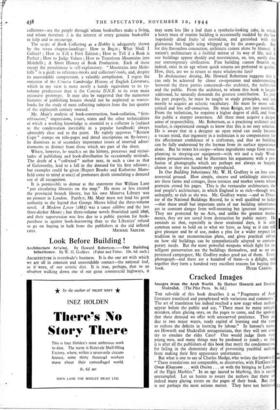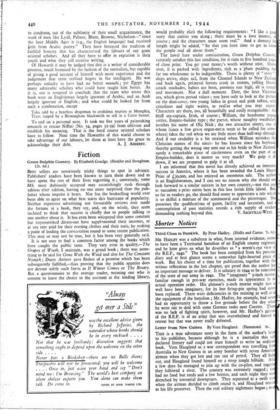Cracked Images
Images from the Arab World. By Herbert 'Howarth and Ibrahim Shukrallah. (The Pilot Press. 9s. 6d.)
THE sub-title of this book describes it as Fragments of Arab literature translated and paraphrased with variations and comments.'' The art of translation has indeed reached a new stage when author appear before the public and say, " There .must be many straigh mistakes, often glaring ones, on the pages to come, and the apology that these demand we offer with unreserved -penitence. They are due to two major wants, ready capital of learning and the time to redress the deficits in learning by labour." In heaven's name are Howarth and Shukrallah nonagenarians, that they will not even try to emulate the elder Cato?' One would judge them very young men, and many things may be pardoned to youth ; so that it is after all the publishers of this book that merit the condemnation for failing in the elementary duty of preventing youthful autho
from making their first appearance unfortunate. . .
But what is one to say of Charles Madge, who writes the foreword? "These translations are comparable, as discoveries, with FitzGera'd' Omar Khayyam . . . with Ossian ... or with the bringing to tondo of the Elgin Marbles." In an age inured to blurbing, this is sure! unexampled. Let us hasten to assure the authors that there indeed many glaring errors on the pages of their book. But tha is not perhaps the most serious matter. They have not hesitate
to condemn, out of the sublimity of their small acquaintance, the work of men like Lyall, Palmer, Blunt, Browne, Nicholson—" since the later Middle Ages it (e.g., the English language) had received Vide from Arabic poetry." They have betrayed the tradition of faithful honesty that has characterised the labours of our great oriental scholars. And all they have to offer in expiation is their youth and what they call creative writing.
Of Howarth it may be judged that this is a writer of considerable promise, much bemused by the fashion of the surrealists, but capable of giving a good account of himself with more experience and the judgement that error realised begets in the intelligent. He was perhaps unlucky to have had no better munshi ; yet Egypt has many admirable scholars who could have taught him better. As it is, one is tempted to conclude that the team who wrote this book were an Englishman largely ignorant of Arabic, and an Arab largely ignorant of English ; and what could be looked for from such a combination, except
Tales told by a heartless dragoman to credulous tourists at Memphis, Trays tapped by a Birmingham blacksmith to sell in a Cairo bazaar.
To end on a personal note. It took me five years of painstaking research to rescue Niffari (No. 34, pages 55-59) from oblivion and establish his meaning. That is the hard course oriental scholars have to follow. Next time the Howarths of this world choose to take advantage of our labours, let them at least have the grace to



























 Previous page
Previous page